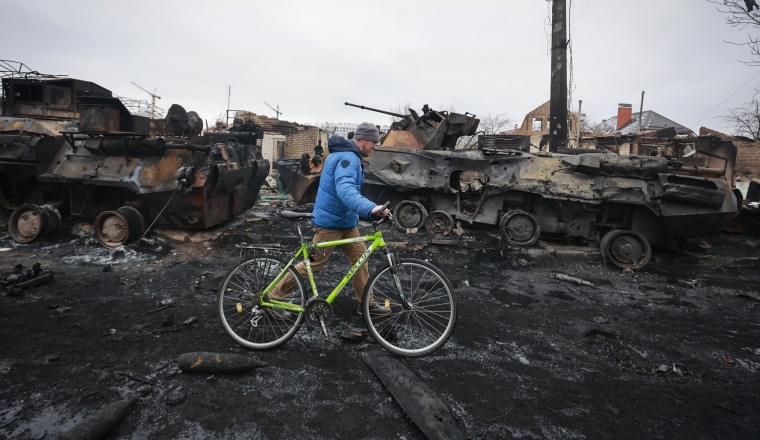Internet outages in Ukraine are becoming more common — with at least one city almost completely offline for a week — as Russia continues its advance on the country, cutting off civilians’ connections with the rest of the world.
While war zones are inherently hectic, the British ministry of defense warned Monday that “Russia is probably targeting Ukraine’s communications infrastructure in order to reduce Ukrainian Citizens’ access to reliable news and information.”
John Spencer, the chair of urban warfare studies at the Madison Policy Forum in New York City, said that eliminating communications infrastructure is often a first objective for an invading army.
“Step one of invading a country is to take out the enemy’s ability to talk to each other,” he said.
“A byproduct of the information war aspect is it prevents civilians from shaping their narrative. But first and foremost, what militaries do is eliminate all capabilities to communicate with each other so they can’t organize fighting; they can’t give each other instructions,” Spencer said.
Residents in the city of Mariupol, which has been enduring an ongoing assault since last week, have been effectively without internet for a week, said Doug Madory, director of analysis at Kentik, a San Francisco company that tracks internet connectivity.
“Mariupol doesn’t account for a lot of the traffic of the country of Ukraine. However, providers there are down, because that place is under siege and getting shelled,” he said.
For Ukrainians fleeing Russian forces, that creates nerve-wracking situations in which people can’t check in on their loved ones. Maxim Naumenko, 24, a social worker from Mariupol who left with his parents and brother soon after Russian forces crossed the border, said he’s been unable to get updates on family members who were still in the city when he left.
He’s received a single Telegram message from a friend there, he said, but otherwise has found it impossible to reach his loved ones, he said.
Connectivity varies wildly across Ukraine, but overall has dipped about 20 percent since the invasion began, said Alp Toker, the director of Netblocks, a British business that tracks internet outages across the globe.
“It’s a big melee right now,” he said. “You have total outages, you have slowdowns, and you have physical cuts involving power,” he said. “We know that war has impacts on telecommunications, but what we’ve seen in Ukraine is on a different level.”
Sometimes, connectivity drops concurrently with local reports of airstrikes hitting communications infrastructure such as cell towers or telecommunications buildings, Toker said.
“With the reports on the ground about the number of telecom stations and the number of cell towers that have been destroyed, it certainly raises the likelihood or essentially corroborates that this infrastructure has been targeted, just as TV towers have been targeted,” he said.
And while large-scale cyberattacks don’t appear to have emerged so far as a key component of Russia’s invasion, the satellite broadband company Viasat was hit by suspected malicious hackers around the time Russian forces crossed the border into Ukraine.
The company believes the incident only affected internet service, not customer data, and it is still working to restore full service, said Chris Phillips, the company’s vice president of public relations.
“Viasat’s partial network outage impacted internet service for fixed broadband customers in Ukraine and elsewhere in Europe,” she said.
A lack of internet connection also exacerbates tensions in the information war between Russian forces and Ukrainian authorities.
Russia has peppered Ukrainians with propaganda, including spamming them with text messages and allegedly defacing local government websites to falsely claim they had surrendered. Ukraine has fought back on its official social media channels and government websites, both to share information about attacks and government services, but also to share war propaganda of its own.
“When people are cut off and are unable to reach the outside world, it creates misinformation and enables disinformation,” Toker said. “Because when authentic sources on the ground can’t speak up, that vacuum is rapidly filled by other voices outside the war zone with their own agenda.”

